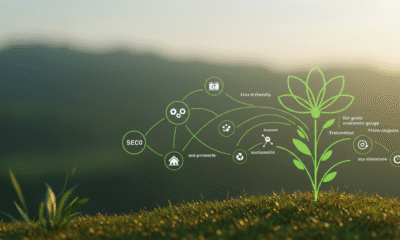

Economy
Risk Of Crunch In Timber Resources Among UK Businesses Failing To Move To Sustainable Practices
WWF is calling for sustainable practices to support availability of timber to meet the future needs of UK’s businesses
· Grave concerns over the future of domestic timber supply among UK forest businesses
· By 2050 less than 22% of UK Timber will be grown in Britain
· Countries that the UK depends on timber from likely to be unable to supply in near future
London: A new report commissioned by WWF today (10th August), finds that UK businesses must invest in sustainable forest management if they are to guarantee access to timber that their businesses rely on in the near future. Leading countries that supply timber to the UK are either at the point of expiry or running at a deficit as forest resources are used without adequate provision for sustainable timber supply.
However, the report highlights key benefits that will make the case for businesses to switch more rapidly to sustainable sourcing. These include:
· advantages in regulatory positioning
· easier raising of finance
· added brand value
· a more engaged workforce
It also gives manufacturers maximum scope for product development and provides retailers with a full range of tradeable goods. These benefits can increase performance of the timber industry as a whole and ultimately aid the bottom line of all companies involved.
As the international market for timber will change in its dynamics in the next decades, without urgent action UK businesses who have failed to adequately plan for continuity of their timber resource could be left exposed with fewer commercial options.
The implications are far reaching with WWF’s Living Forests report series concluding that global demand for timber is expected to triple by 2050 due to an increase in demand of wood and paper products from growing economies and populations. At the same time this report’s analysis indicates that:
· Brazil has only 16 years of timber forests remaining, South Africa 7 years, Colombia 12 years, Mexico 9 years, Nigeria 11 years, Thailand 9 years and Pakistan 10 years.
· Primary forest is being depleted at an alarming rate in many forested countries, the most extreme examples being Nigeria, losing 99% of primary forest, and Vietnam 80% since 1990 – a loss of almost 2 million hectares in these two countries alone. This has a huge impact on the biodiversity and other important forest ecosystem functions.
· In the UK by 2050 less than 22% of the timber will originate from Britain.
· All the UK foresters interviewed for the report expressed grave concerns over the future of domestic softwood supply.
The report also sets out how sourcing timber from sustainably managed forests, will help protect the natural environment as forests not only provide timber but also supply a range of ecosystem services, such as carbon sequestration, water provision, flood prevention, erosion control and biodiversity. Securing long-term supply of timber from sustainably managed forests, will help protect wildlife and ecosystem functions residing in these forests, as well assisting in securing wider social benefits, and is also a contributor to the bottom line of businesses utilising timber as a resource, which currently is as yet widely unaccounted for as a benefit, only as a cost.
Julia Young, Global Forest and Trade Network Manager for WWF-UK commented:
“Committing to sustainable timber sourcing isn’t just an added bonus, but is something that any timber dependent business must be investing in if they want a healthy and resilient business that will survive. This report sets out important areas in business functions where benefits are likely to accrue, but are not accounted for when making decisions about the overall cost benefit of sustainable sourcing. We can no longer rely on our usual sources of timber as unsustainable practices are having devastating consequences on forests, and we face a real danger of not having enough timber to satisfy our growing population needs.
“Businesses need to review how their timber is sourced if they want to secure supply for the future, and in keep timber prices stable. This will have tangible business benefits of sustainable practices including advantages in regulatory positioning, easier raising of finance, brand value and an engaged workforce. It also gives manufacturers maximum scope for product development and provides retailers with a full range of tradeable goods. These business benefits can increase performance and ultimately aid the bottom line.”
“The UK Government must lead by example and address sustainable forest use in the urgently upcoming 25 year plan for nature.”





























